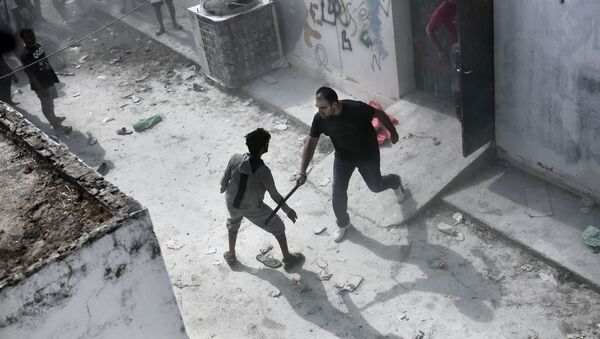Being able to reach the shores of Greece in just an hour, thousands of future asylum-seekers have chosen Lesbos as their first stop on the long road to the “European paradise” many of them dream of. However, they are met with harsh conditions on the Greek island and on the way to it.
Lesbos, which has been a popular tourist destination for its historical attractions, beautiful sceneries and turquoise sea, was unprepared for the huge flow of undocumented migrants, now seeing a 750% increase in 2015.
The living conditions for refugees are awful, as described in multiple journalist and agencies’ assessments. Sanitary facilities are reportedly out of order, showers either absent or unequipped, living tents are overcrowded and beds teem with fleas, a Washington Post reporter describes.
“We ran away from war. We ran away from violence. We came to Europe because we want to live like human beings,” Zahra Jafari, a 30-year-old Afghan, was quoted as saying by the Post. “But here it smells so bad. There’s no water here. There’s no food here. This is the opposite of what we thought Europe would be,” she said. “It’s a disaster — just like my country.”
Another refugee argues it’s still better than in his war-torn homeland.
“At least there’s no violence here. No bombs exploding. No kidnappings,” said to the Post Haydar Majid, a 32-year-old Iraqi, who used to work as an interpreter for the U.S. Army. “But this place isn’t for humans. It’s for animals,” he still added.
The people who come to start a new life in Europe usually do not travel with empty pockets – they bring thousands of euros cash to be able to settle in the Union. When money travels, too often there are criminals who want to plunder such a prize. In this case, pirates.
In the international waters between Turkey and Greece, speedboats bearing no markings come out of nowhere with masked men pointing their guns at terrified people onboard cockleshells. Attackers are dressed in black, some of them blue-eyed, they speak only English, sometimes they shoot into the migrant boats and very often beat passengers with long whips to force them turn their boats around or otherwise. This is how numerous witnesses repeatedly account the mysterious assaults.
“They shot at the boat with three bullets,” the Huffington Post cites Mohamed, who in spite of an attack of the masked men made it to Lesbos. “They hit us with six-meter-long sticks. They circled around us trying to flip our boat.”
In other cases, the gunmen violently stripped and robbed passengers after forcing them into a larger vessel.
There have been numerous claims about the Hellenic Coast Guard backing the mysterious masked attackers or even beating refugees themselves. However, in recent weeks Greek law enforcement have detained a number of people who allegedly participated in armed raids against migrants in international waters. Forbes reported, referring to the Coast Guard, the detainees were Greeks, wearing Coast Guard uniform.
Legally, it’s quite hard to fight against such criminals.
“As a general rule, it's true to say that no country has much power to do anything much in relation to what happens in international waters,” Martin Davies, director of Tulane University's Maritime Law Center in New Orleans, told the reporters. “The key exception is piracy, which is regarded as being a crime of universal jurisdiction, which means that any country, anywhere, may take action against it.”







